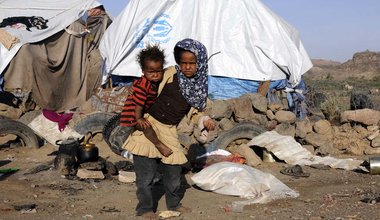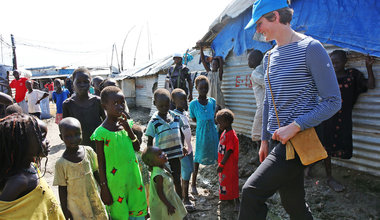At UN, European leaders stress importance of international cooperation to tackle global challenges
 Emphasizing in an address to the United Nations today the magnitude of the challenges confronting the world, the Prime Minister of Norway underlined that effective international cooperation is essential to address poverty, conflicts, climate change, migration and terrorism.
Emphasizing in an address to the United Nations today the magnitude of the challenges confronting the world, the Prime Minister of Norway underlined that effective international cooperation is essential to address poverty, conflicts, climate change, migration and terrorism.
In her address to the UN General Assembly, Prime Minister Erna Solberg further noted that in in today's interconnected world, instability in the Middle East and North Africa is causing widespread human suffering and also leading to violent extremism in Europe.
“The response should not be to isolate ourselves, but to cooperate and find solutions,” Prime Minister Solberg said, adding that Norway will continue to provide assistance to the countries in need.
Emphasizing that the humanitarian situation in Syria “simply cannot be tolerated,” she called on global and regional powers to act to secure an enduring ceasefire and ensure that humanitarians have urgent access.
She also called for strengthening the capability of the UN to help countries emerging from conflict, and said the international community has a clear responsibility to fight terrorism and prevent violent extremism. “In order to do so, we need to work closely with civil society, women, young people, faith leaders, and with local communities,” she noted.
Ms. Solberg further said that the need to translate the UN women, peace and security agenda into more effective action on the ground and stressed that sexual exploitation and abuse must stop, calling for zero tolerance and firm action by the UN.
She also called for adequate resources for UN peacekeepers, development workers and humanitarian workers and said that Norway would continue to do its part.
Turning to the importance of the Sustainable Development Goals (SDGs), she said that the global development goals are not only ground breaking but also provide a roadmap for attain the future we want.
“The SDGs are all about building inclusive societies, inclusive societies reform better,” she said, underling that the rights to education and health are imperative in this regard.
Placing particular emphasis on education of girls, she added: “When girls go to school and get an education, this is not only their fundamental right, it is also good for the economy,” and said that global education will continue to be the top priority of Norway's development policy, as would its efforts to strengthen epidemic preparedness and global health security.
She also underlined the growing threat of antimicrobial resistance that is making vaccines and conventional medical treatment increasingly ineffective, she expressed: “If we do not act, we could reach a stage where common infections are once again deadly.”
In her address, the Norwegian leader also underlined the importance of the Paris Agreement on climate change, adopted last year, and called for effective and concerted action to bring down emissions and to meet the ambitious objectives that we have set.
She also spoke of her country's support for reform of UN peace operations and called for promoting an independent and credible UN that can play a uniting and leading role in the world.
Dutch Foreign Minister Bert Koenders stressed that for all its failings, with geopolitical fault lines deepening, growth stagnating, inequality growing, refugees surging worldwide, and new wars breaking out, the UN, as “the best imperfect global organisation we have” is still the best hope for producing a better world.
“I realize that the UN is often seen as a helpless, fragmented and overwhelmed organization that is struggling to cope with the challenges it faces,” he told the Assembly. “And yet, the UN has no choice but to play a key role in delivering solutions, now and in the future. To make the world safer, more just and better prepared for what the future brings.
“Because there is no alternative. The UN is the best imperfect global organization we have. The only global organisation that embodies the principles of multilateralism: legitimacy, universality and norm-setting authority. An organisation that has not only convening power, but also the ability to deliver services on a global scale,” he said.
He called for reforms, including enlarging the 15-member Security Council to reflect the realities of the world, and warned that the vetoes held by China, France, Russia, the United Kingdom and United States should not render the Council powerless, especially when mass atrocities are being committed.
Bulgarian President Rosen Plevneliev called for active reform to strengthen the UN as it faces a host of crises from achieving the SDGs and coping with record refugee flows to ending the bloodshed in Syria and combatting terrorism.
“The United Nations has a crucial role to play in addressing these challenges. Our crisis management efforts require a holistic UN response, preventive diplomacy, mediation, peace-building, resilience and reconciliation,” he said.
“It is widely recognized that the UN must change and adapt to the new realities. We need an Organization that is properly equipped to meet new challenges and is responsive to ever-growing needs. Strengthening transparency, coherence and cost-efficiency of the UN system is of paramount importance.”
Mr. Plevneliev stressed that bringing back peace and reconciliation to Syria can only be achieved through a Syrian-led political process involving an inclusive transition and underlined the important UN role in coordinating comprehensive counter-terrorism actions.
He also urged ensuring equal opportunities for women in gaining access to senior decision-making positions, including that of Secretary-General, adding that with UN Educational, Scientific and Cultural Organization (UNESCO) Director-General Irina Bokova his own country has “a very strong candidate, a true leader with extensive experience in international relations and excellent management skills.
“A candidate who deserves your trust and support,” he concluded.
In his remarks, Serge Telle, Minister of State of Monaco, said the world would see a steep rise in climate-induced migration in the coming decades. In 2015, the number of climate refugees fleeing damaged ecosystems could increase to as many as 250 million, according to projections by the UN. “This issue is of monumental importance to Monaco and one of the reasons behind the State’s engagement in the 2030 Agenda and in the Paris Agreement, which we will ratify by the end of 2016,” he stated.
Although Monaco is responsible for a small portion of global emissions, the country has the ambition to be a leader in energy innovation, he said. Monaco also has committed to reduce greenhouse emissions by 50 per cent in the year 2030 (from 1990 levels). Those transitions have a cost, but his country is convinced the price for a greener world was “minimal compared to the cost of non-action”. In line with its support for green environmental policy, Monaco remained a loyal supporter of the Green Climate Fund.
 UN
UN










